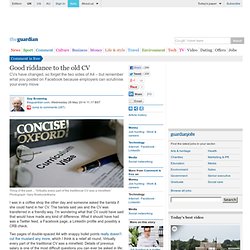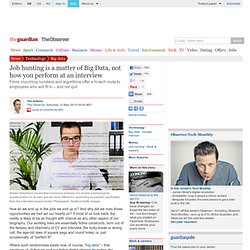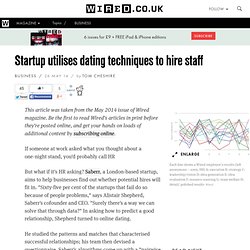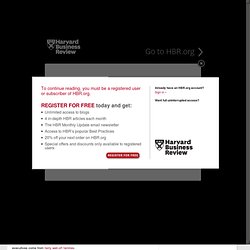

Good riddance to the old CV. Thing of the past ... 'Virtually every part of the traditional CV was a minefield.' Photograph: Gary Roebuck/Alamy I was in a coffee shop the other day and someone asked the barista if she could hand in her CV.

The barista said yes and the CV was transferred in a friendly way. I'm wondering what that CV could have said that would have made any kind of difference. Two pages of double-spaced A4 with snappy bullet points really doesn't cut the mustard any more, which I think is a relief all round. CVs have moved online to LinkedIn but that has its own special dangers. Before you despair about your online anti-employment campaign console yourself with the fact that you'll probably have to apply for your job online and that a loftily disinterested computer will make the first cut.
Job hunting is a matter of Big Data, not how you perform at an interview. How do we end up in the jobs we end up in?

And why did we miss those opportunities we had set our hearts on? If most of us look back, the reality is likely to be as fraught with chance as any other aspect of our biography. Our working lives are essentially fictive constructs, born out of the fantasy and chemistry of CV and interview, the lucky break or wrong call, the age-old laws of square pegs and round holes, or, just occasionally, of "perfect fit".
Where such randomness exists now, of course, "big data" – that amalgam of all that we and our fellow digital citizens do online, the gigabyte human traces we bequeath second by second to machines – is certain to follow. El algoritmo para encontrar trabajo creado por un ex de Wall Street. “Venga a mi despacho”, la llamada urgente y sin nada previamente planificado presagiaba lo peor.

Y los temores no eran infundados: “lo siento, ya no necesitamos de sus servicios”. Bum. El joven y cualificado Adam Grealish pasó a ser un número más en la lista de parados, de los caídos por el colapso financiero de 2008 con el epicentro en el mismo Wall Street que daba empleo a este ejecutivo. El estadounidense inició el periplo de la búsqueda de trabajo: poner en orden el currículo, llamadas a esos contactos VIP que siempre te pueden sacar de un apuro y adentrarse en las inciertas aguas de buscar ofertas de empleo que se adapten a lo que uno busca. Headhunters, LinkedIn… pasaron las semanas, los meses y Grealish se desesperaba. El algoritmo para encontrar trabajo creado por un ex de Wall Street Entonces, su pequeño programa no tardó en dar sus frutos y este hábil profesional fue fichado por Goldman Sachs. El día que fuí contratado por Goldman Sachs. The Coca-Cola Company: How Social Media Is Fueling the Job Search Process for Candidates and Companies Alike. In today's war for talent, social networks have redrawn the battle lines by empowering parties on both sides of the negotiating table with unprecedented networking, communications and brand-building tools.
In the past few years alone, LinkedIn , Facebook , Twitter and other platforms have changed the way companies of all shapes and sizes find and source talent. The recruiter-candidate relationship, once shrouded in formality, is now far more conversational and transparent. “Tracking down the right people or opportunities used to require hours of phone calls and private-investigator-type legwork,” says Kevin Shigley, director of global talent acquisition at . “Now the barrier to entry – information – is no longer a barrier. The Internet is the great democratizer of data.” ‘A Two-Way Street’ “You no longer need to know someone in-house to get an interview,” says Dan Schawbel , managing partner of Millennial Branding, a Gen Y research and consulting firm. The Résumé, Revisited. Job hunting is a matter of Big Data, not how you perform at an interview. Startup utilises dating techniques to hire staff. This article was taken from the May 2014 issue of Wired magazine.

Be the first to read Wired's articles in print before they're posted online, and get your hands on loads of additional content by subscribing online. If someone at work asked what you thought about a one-night stand, you'd probably call HR But what if it's HR asking? Saberr, a London-based startup, aims to help businesses find out whether potential hires will fit in. "Sixty-five per cent of the startups that fail do so because of people problems," says Alistair Shepherd, Saberr's cofounder and CEO.
He studied the patterns and matches that characterised successful relationships; his team then devised a questionnaire. Resumes Are Messing Up Hiring - Terence Tse, Mark Esposito, and Olaf Groth. By Terence Tse, Mark Esposito and Olaf Groth | 11:00 AM July 14, 2014 While we are surrounded by a wave of new disruptive technologies and apps, HR still hasn’t improved how it evaluates the prospective workforce.

Traditional hiring processes that revolve around CVs are no longer sufficient – they don’t pinpoint the right qualities demanded of leaders today, and their dated criteria obscures many talented individuals from even hitting the radar. There is nothing inherently wrong with resumes – they highlight applicants’ past achievements and experience. But while CVs are good at showcasing formal skills, they’re not very useful for identifying values and behavior.